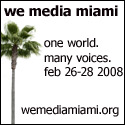 I’m not going to liveblog the WeMedia conference – they’re doing a fine job of that on their blog. Instead I’ll free associate a bit. Forgive any snark – I’m not going to have much time to edit myself.
I’m not going to liveblog the WeMedia conference – they’re doing a fine job of that on their blog. Instead I’ll free associate a bit. Forgive any snark – I’m not going to have much time to edit myself.
There’s an evangelical aspect to this event which seems strange to me: the first speakers seem to think that they need to convince the audience of things that the communities I hang with pretty much take for granted: everything is digital, information communities are localizing, the Internet enables individuals as news creators, gatherers, organizers and sharers. Trust matters. I suppose that the reduced relative power of big centralized media may be a bitter pill for some of the old media moguls, but surely they have to have faced it by now? Then again, there’s lots of grey hair in the room. I often feel like Methuselah at tech events – here I’m middle of the pack, if that.
More encouraging is the next question – “what’s next?” But they don’t answer it.
They tell us content isn’t the only king– access matters too. [For a contrary view, see “context is king”.]
One thing that’s very noticeable: they sure have more beautiful slides with better transitions than the geeks do; and much better than the lawyers; but the pretty slides don’t actually say much.
OK, here’s some data: 2/3 of Americans think journalism is out of touch; 2/3 are dissatisfied with quality of journalism in their communities; 48% say the Internet is their primary source of news and information.
Conclusion: “The digital age is here”. I had guessed that.
Next Session: “Print is Dead”
One of the speakers is Jeff Gomez, who wrote a book called “Print is Dead”. It sold well. He has an interesting-looking blog. He’s engaging, but again, I’m not sure where I’d find the news hook if I were covering this.
If newspapers are dead, who killed them? I say it was suicide: they took a dive on the war and just about every other difficult issue in the last six years. Media consolidation destroyed competition and made them dull and complacent – no more newspaper wars or even am/pm rivalries. Meanwhile TV (sometimes cross-owned by conglomerates that owned the paper) gave us years of “a white woman is missing” and dumb trials. No wonder people don’t take them seriously. (Cf. Yesterday's News Tomorrow (Literally))
Interestingly, the guy behind me – an old media honcho with a law degree – is doing his work. I asked him what he thought of the speakers, and he says he’s heard it all before. (“Listening to Lazarus” he says.) I suspect the audience is ahead of the presenters. In fact, I suspect the presenters know a lot more than they let on.
I should note that, so far, the next session, “Print reincarnated” (Richard Sarnoff & Willam C. Weiss) has a lot more interesting content about things that print media are doing to tie in to new media and make the two work together — from my perspective it's lots of smart small stuff, though, as much as any one big idea beyond “connect”. Perversely, the value of this session means there's a good chance I won't write as much about it, because I'm too busy listening. Random fact: they don't have slides.

“Theres an evangelical aspect to this event which seems strange to me:”
That’s because you’re in the echo chamber, where President Ron Paul succeeded President Howard Dean.
In reality, while there are real changes, there’s also a small but very active group of hypesters who are presenting themselves as people Who Have It All Figured Out (stock options and consulting gigs, please).
And it’s not at all clear that those marketers know anything at all except to jump on the winning bandwagon and spew buzzwords.
See also my recent column at http://www.guardian.co.uk/technology/2008/feb/14/politics.internet